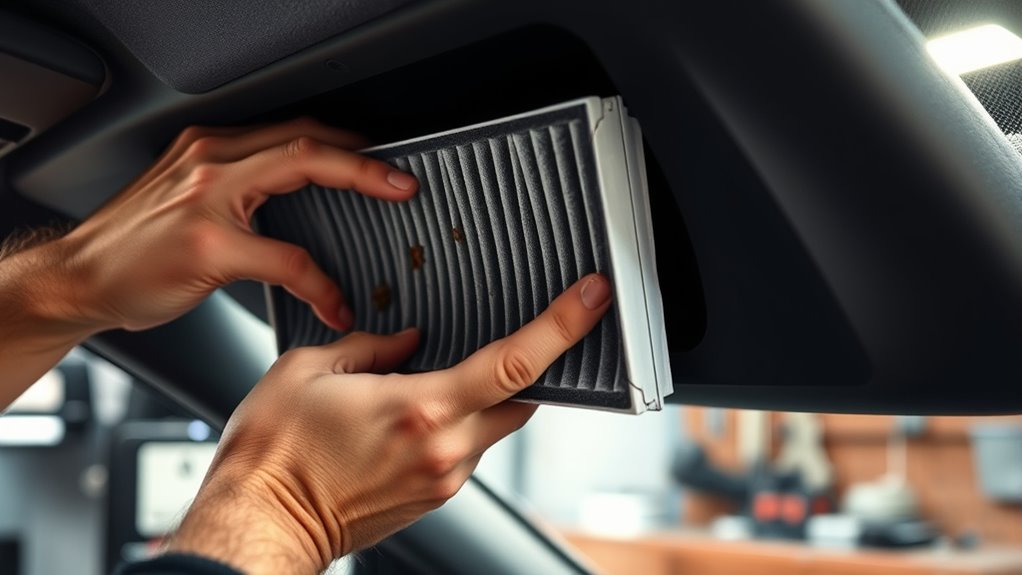Typically, you should replace your cabin air filter every 12,000 to 30,000 miles, or at least once a year, especially in dusty environments. Engine air filters often need changing every 12,000 to 15,000 miles, but this can vary based on conditions. Signs like reduced airflow or strange engine noises mean it’s time for a change. Keep an eye on these details to maintain your vehicle’s performance—more helpful tips follow.
Key Takeaways
- Cabin air filters typically need replacement every 12,000 to 30,000 miles or annually, depending on driving conditions.
- Engine air filters are generally replaced every 12,000 to 15,000 miles or annually, with more frequent changes in dusty environments.
- Signs like reduced airflow, bad odors, or engine performance issues indicate it’s time to replace filters sooner.
- Regular inspections based on manufacturer guidelines help maintain optimal airflow and engine efficiency.
- Driving in polluted, dusty, or urban areas often necessitates more frequent filter replacements.
Typical Replacement Intervals for Cabin Air Filters
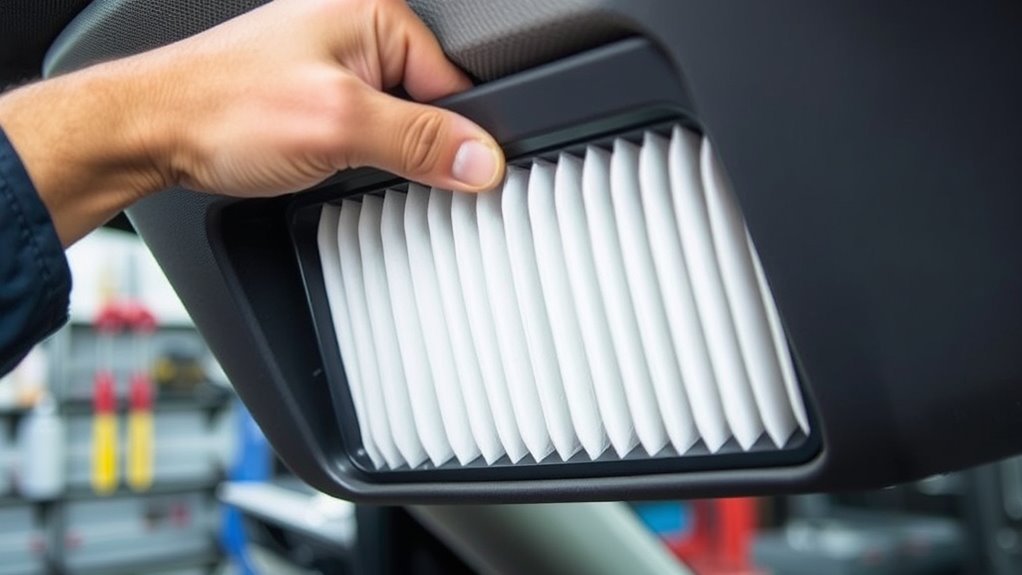
Typically, cabin air filters should be replaced every 12,000 to 30,000 miles, depending on your vehicle and driving conditions. Most experts recommend changing them at least once a year, which usually equates to about 12,000-15,000 miles for average driving. Some manufacturers suggest replacing every 20,000 miles or every two years as a standard guideline. However, the actual interval can vary based on where you drive and environmental factors. If you’re in a dusty or polluted area, you may need to replace the filter more often, sometimes well before 15,000 miles. Regular checks for dirt, debris, pet hair, or odors can help you determine if it’s time for a replacement, ensuring your cabin air stays clean and fresh. Environmental conditions play a significant role in how frequently you should change your cabin air filter. Additionally, using proper maintenance practices can extend the lifespan of your filter and maintain optimal air quality inside your vehicle. Understanding vehicle maintenance can help you identify other components that influence cabin air quality and overall vehicle health.
Typical Replacement Intervals for Engine Air Filters
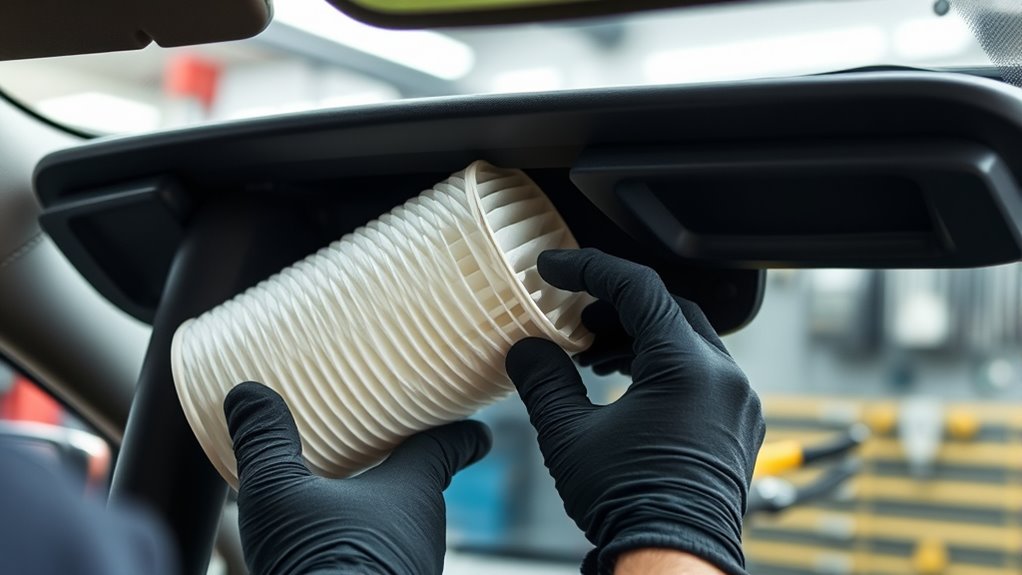
Engine air filters usually need replacement every 12,000 to 15,000 miles or about once a year, whichever comes first. However, some vehicles can go up to 30,000 to 45,000 miles between changes, depending on driving conditions. Always check your owner’s manual for manufacturer recommendations tailored to your car model. If you drive in dusty, sandy, or polluted environments, expect to replace the filter more frequently. Driving on gravel roads or in urban areas with heavy traffic accelerates clogging. Harsh weather or high allergen areas also shorten filter lifespan. A clean air filter improves engine efficiency, fuel economy, and reduces emissions. Regular inspections help determine if an earlier replacement is needed, ensuring your engine runs smoothly and lasts longer. Additionally, inspecting your air filter periodically can help identify when it needs to be replaced before it causes performance issues. Proper air flow is essential for optimal engine operation and longevity. Considering sound healing science principles, a well-maintained air filter can be seen as supporting the “vibrations” of your engine, helping it run more harmoniously.
Signs That Indicate Cabin Air Filter Replacement Is Needed
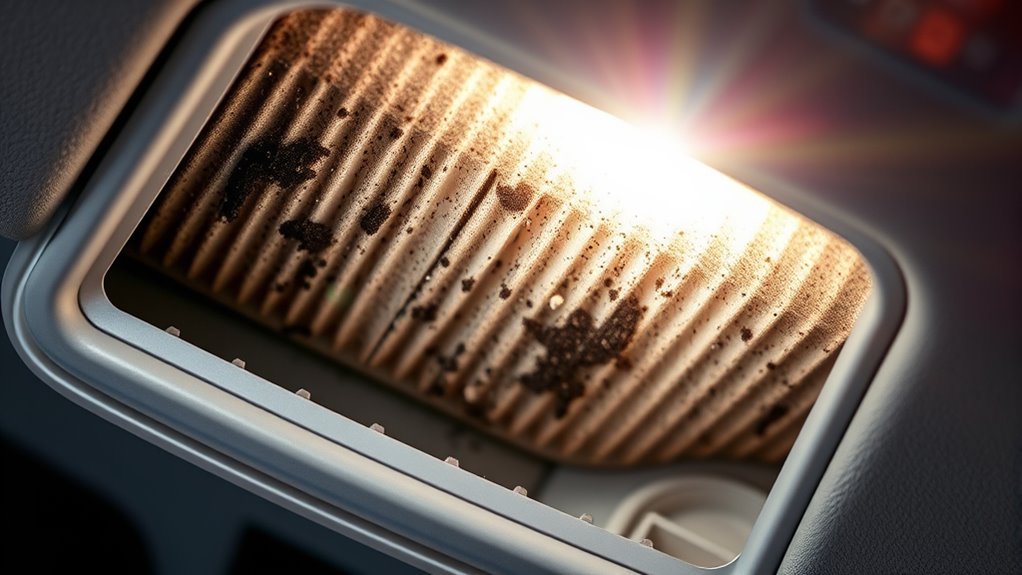
If you notice weaker airflow from your vents or your HVAC takes longer to heat or cool, it might be time to check your cabin air filter. Unpleasant odors like musty or chemical smells can also signal that the filter is clogged or contaminated. Recognizing these signs early helps maintain good air quality and HVAC performance. Additionally, using an air purifier with HEPA filters can further improve indoor air quality by removing airborne particles and allergens. Being aware of Bitcoin IRA strategies can help you better understand how to protect your investments during market fluctuations.
Reduced Airflow in Vents
Reduced airflow from your vehicle’s vents is a clear sign that your cabin air filter may be clogged or dirty. When the filter becomes blocked, it restricts airflow through the HVAC system, making it harder to heat or cool the cabin efficiently. You might notice longer times to reach your desired temperature or foggy windows due to inadequate defrosting. The blower motor may also work harder, potentially causing unusual noises or increased wear. Dust and debris trapped in the filter can worsen airflow issues and allow more dirt into the interior, reducing air quality. Clogged filters can also strain the HVAC system, leading to costly repairs if left unaddressed. If you experience weak or inconsistent airflow, it’s likely time to check and replace your cabin air filter. Doing so restores proper ventilation, improves comfort, and prevents further system strain. Regularly inspecting the air filtration system can help maintain optimal airflow and indoor air quality, especially since air quality can be affected by environmental factors.
Unpleasant Cabin Odors
Unpleasant cabin odors are a clear sign that your vehicle’s cabin air filter may need replacing. Musty or moldy smells often come from a clogged filter, especially when you turn on the heat or defroster. Warm air passes through trapped moisture and contaminants, intensifying the odor. If you notice persistent bad smells that aren’t from external sources, it’s likely your filter is degraded. A dirty filter allows dust, debris, pollen, and mold to enter the cabin, compromising air quality and potentially causing allergies or respiratory issues. You might also detect odors directly from the vents, especially when using the A/C or heater. Visible mold or mildew on the filter confirms the need for replacement, preventing further contamination and restoring fresh airflow in your vehicle. Regularly inspecting and replacing your cabin filter is essential for maintaining a clean and healthy interior environment. Additionally, air quality maintenance contributes to overall vehicle comfort and safety. Recognizing the signs of a failing filter early can help prevent respiratory issues and ensure a healthier driving experience.
Signs That Indicate Engine Air Filter Replacement Is Needed

If you notice your engine seems less responsive or struggles to accelerate, your air filter might be clogged. Strange noises like coughing or wheezing can also signal restricted airflow caused by dirt buildup. Additionally, a drop in fuel efficiency or unusual engine sounds are clear signs you need to check your filter promptly. A blocked air filter can also trigger the Check Engine Light Indicator, alerting you to potential airflow issues within your engine system. Recognizing engine maintenance intervals and adhering to recommended replacement schedules can help prevent these problems and ensure optimal engine performance. Proper airflow management is essential for maintaining engine health and efficiency, as restricted airflow can cause various operational issues. Recognizing angel numbers associated with love and transformation can also serve as spiritual signs guiding you toward personal growth and better harmony in your life.
Decreased Engine Power
When your engine starts to feel sluggish or unresponsive, it’s often a sign that the air filter may be clogged and needs replacing. You might notice:
- Sluggish acceleration or decreased responsiveness when pressing the gas pedal, indicating restricted airflow.
- Engine hesitation or difficulty maintaining speed due to insufficient air for proper combustion.
- Noticeable engine lag during acceleration, which results from dirt or debris blocking airflow.
Other signs include slower throttle response, rough or unstable engine idling, and unusual engine noises like coughing or backfiring. These symptoms point to airflow restriction, causing incomplete combustion and engine performance issues. Addressing a clogged air filter promptly helps restore power, improve responsiveness, and prevent further engine problems. Increased fuel consumption and higher emissions are also common when the air filter is clogged, further emphasizing the importance of timely replacement. Regularly inspecting and replacing the air filtration system can prevent these issues and maintain optimal engine performance. Proper maintenance of the air intake system can also prolong engine life and enhance overall vehicle reliability.
Poor Fuel Economy
A clogged air filter not only affects engine power but also leads to noticeable drops in fuel economy. Restricted airflow reduces combustion efficiency, causing your engine to burn more fuel to compensate. You might notice you’ll need to refuel more often or see higher fuel expenses. Vehicles with fuel efficiency monitoring may show a clear decline when the air filter is dirty. Additionally, a significant drop in miles per gallon (MPG) is a strong sign it’s time to inspect or replace the filter. Poor fuel economy often accompanies other symptoms, like exhaust odors or check engine lights, reinforcing the need for timely maintenance. Replacing a dirty air filter helps restore ideal airflow, improving fuel efficiency and saving you money over time. Regular inspection intervals can help catch a dirty filter before it significantly impacts fuel economy. Given the importance of AI security, staying aware of potential vulnerabilities in vehicle systems connected to AI technology can further protect your vehicle’s performance. Monitoring engine performance can also provide early warning signs of air filter issues, preventing costly repairs.
Unusual Engine Noises
Unusual engine noises are clear signals that your air filter may need replacing. You might notice:
- Popping, spitting, or coughing sounds, indicating airflow obstruction and inefficient combustion.
- Whistling or wheezing noises, which suggest restricted airflow from a clogged filter affecting engine breathing.
- Loud rumbling or knocking sounds, often linked to exhaust issues caused by poor air supply. These noises can also be caused by other engine problems, but a dirty air filter is a common culprit. Restricted airflow impacts the air-fuel mixture, leading to suboptimal engine performance.
These noises often accompany symptoms like rough idling, difficulty starting, or decreased performance. When airflow is restricted, misfiring spark plugs and uneven engine operation become common. If you hear persistent or unusual engine sounds, it’s a sign to check your air filter. Replacing it promptly restores proper airflow, reducing engine noise and preventing further damage.
Consequences of Neglecting Filter Replacements

Neglecting to replace your air filters can lead to serious engine and system issues that affect your vehicle’s performance and longevity. When filters are clogged, airflow is restricted, causing inefficient fuel combustion and higher fuel consumption—up to 10% in older vehicles. This sluggish airflow reduces throttle response, making acceleration feel unresponsive, and increases emissions due to incomplete combustion. Over time, dirt and particles can enter the engine, causing internal damage and premature failure. Neglected filters can lead to engine overheating, spark plug fouling, and increased wear on engine parts, raising repair costs. Additionally, dirty cabin filters allow dust and allergens inside, degrading air quality and passenger comfort. Ultimately, ignoring filter maintenance accelerates wear, diminishes reliability, and results in costly repairs.
Factors That Influence Replacement Frequency
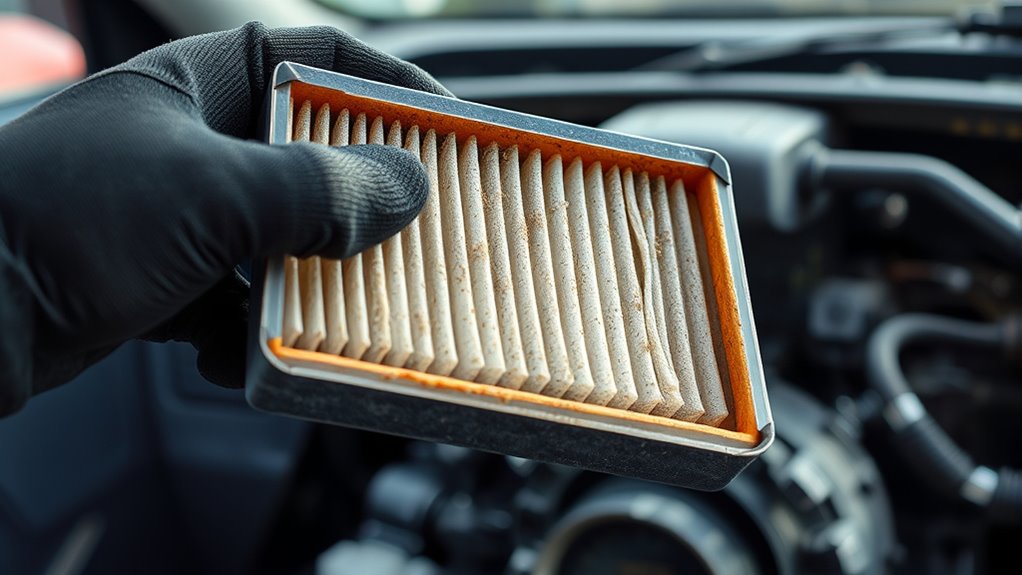
Several factors influence how often you should replace your vehicle’s air filter, including the type and material of the filter, driving conditions, and manufacturer recommendations. The quality of the filter material also impacts its durability, with higher-quality filters generally lasting longer.
- Filter Type and Material: Synthetic filters last longer than paper or cotton ones, which usually need changing every 12,000 to 15,000 miles. High-performance or reusable filters can extend intervals but require proper cleaning.
- Driving and Environment: Dusty roads, urban pollution, pollen, and coastal conditions cause quicker clogging. Stop-and-go city driving increases debris buildup compared to highway driving.
- Manufacturer Guidance: Most automakers recommend replacing filters every 12,000 to 30,000 miles, following your owner’s manual. Some vehicles tolerate longer intervals, but adhering to OEM suggestions ensures ideal performance.
Tips for Maintaining Optimal Air Filter Performance
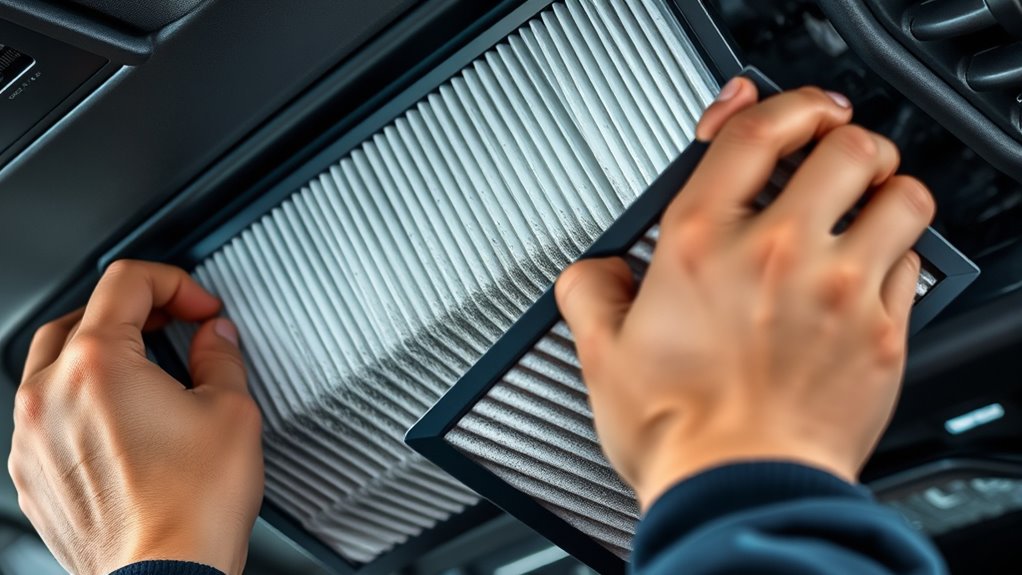
To keep your air filter performing at its best, proper storage and handling are essential. Store replacement filters in a dry, clean place to prevent contamination and damage. Avoid dropping boxes on hard surfaces, which can harm the filter’s structure. Keep components like clamps, fasteners, and housing clean and functional to guarantee ideal performance. When removing filters, do so carefully to avoid spreading dirt and contaminants. Confirm correct installation by checking that clamps, bolts, and seals are secure, preventing unfiltered air from bypassing. Regularly inspect filters visually for heavy dirt or damage, and clean reusable filters gently with a vacuum or mild detergent, ensuring they’re fully dry before reinstalling. Storing filters properly helps maintain their integrity and effectiveness. Proper handling and inspection help extend filter life and maintain engine efficiency.
Frequently Asked Questions
Can I Replace Air Filters Myself or Should I Visit a Mechanic?
You can definitely replace your air filters yourself if you’re comfortable with basic tools and follow step-by-step guides. Most filters are accessible and straightforward to install, saving you money. However, if the filters are hard to reach, involve complex housings, or you’re unsure about proper installation, it’s best to visit a mechanic. They ensure correct fit, avoid damage, and handle any tricky components safely.
Are There Specific Filters Suitable for Allergy Sufferers?
Yes, there are filters designed specifically for allergy sufferers that you should consider. These certified filters, like those with activated carbon layers or HEPA-like filtration, trap pollen, mold, and dust mites more effectively. Using these filters can dramatically reduce your exposure to allergens and improve your driving comfort. Don’t settle for ordinary filters—opt for allergy-friendly options to keep your cabin environment healthier and more breathable every time you get in.
How Can I Tell if My Filter Needs an Immediate Replacement?
You’ll want to replace your filter immediately if it looks gray, dark, or clogged with dirt and debris, or if light barely passes through when held up. Also, watch for dust, pollen, or tears in the filter media. If you notice engine hesitation, reduced power, black smoke, or a persistent smell of fuel, these are signs your filter’s severely compromised and needs urgent attention.
Do Different Vehicle Brands Have Unique Air Filter Replacement Schedules?
Yes, different vehicle brands do have unique air filter replacement schedules. You might find some brands recommending changes every 12,000 miles, while others suggest up to 30,000 miles or more. These variations depend on the engine design, filtration technology, and typical driving conditions. Always check your owner’s manual for the specific schedule, as harsh environments or turbocharged engines could require more frequent replacements. Keep an eye on your vehicle’s performance, too.
What Are the Environmental Impacts of Disposing of Old Air Filters?
When you dispose of old air filters, you contribute to landfill waste since most are non-biodegradable, filling large spaces and risking environmental pollution. Manufacturing and transportation of filters emit greenhouse gases, and improper disposal can release microfibers and dust into the environment. Choosing reusable filters helps reduce waste and emissions, but proper recycling and disposal practices are essential to minimize environmental harm and support sustainability efforts.
Conclusion
Remember, your filters are like the lungs of your car, quietly working to keep the air clean. When you swap them out on time, it’s like giving your vehicle fresh breath and a clear breeze through the vents. Neglecting this simple task is like choking on stale, dusty air every time you drive. Stay proactive, follow your maintenance schedule, and enjoy smooth, crisp airflow — your car will thank you with every comfortable, fresh ride.
